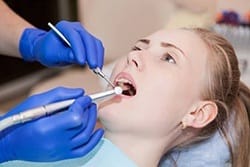Tooth Extractions – Downers Grove, IL
Remove Damaged Teeth Comfortably and Effectively!
While it’s not exactly something patients want to hear, the implications of not removing a severely damaged or infected tooth can be lethal if not taken into consideration. The dentists at Esplanade Dental do everything they can to save and restore teeth, as there is no restoration out there currently better than what you were born with. In the event that you need a tooth extraction, whether it’s for a wisdom tooth or a damaged tooth, you can feel confident that your treatment will be done with your comfort in mind. Contact our office today to schedule an appointment with any of our highly-trained dental professionals!
When is a Tooth Extraction Performed?

Tooth extractions can be performed for many different reasons. For example, many people cannot accommodate third molars, also known as wisdom teeth, and therefore need to have them removed. In other cases, a tooth that’s severely damaged either by decay or forced trauma may not be salvageable via filling, crown or root canal treatment.
If one of our dentists determines that you need an extraction, it’s mainly because your damaged tooth is at risk of causing problems to other areas of your mouth or at some point later in life. Your oral health is always the number-one priority and any threat to that needs to be addressed promptly. Allowing a tooth to harbor bacteria and potentially infect neighboring teeth is far worse than extracting and replacing the tooth later.
What Does Treatment Entail?

Tooth extractions can be relatively straightforward or more complicated depending on the case. For example, wisdom tooth extractions can be quite simple if the tooth is fully visible. This only requires elevating the tooth in order to break it from the periodontal ligament, then pulling it out with a set of dental forceps. Don’t worry, all tooth extractions involve local anesthetic to numb the tooth and surrounding gum tissue. This ensures that your extraction is as comfortable as possible.
In the event that your tooth is covered by gum tissue, which can easily occur if a wisdom tooth becomes impacted, then a small incision will be made to access that tooth. The gum tissue is then sealed with stitches that are either removed at a later date or dissolve naturally inside the mouth.
The dentist may also need to break the tooth apart into smaller pieces and removed individually. Regardless, extractions generally only take one appointment to perform. Our dentists will go over your unique case in more detail and help you plan before and after treatment is complete.
What Aftercare Steps Should I Follow?

Patients undergoing extractions will typically be prescribed painkillers to aid their recovery. Soreness and tenderness is common, so it’s important that you get plenty of rest and avoid strenuous activities for the next 24 hours. If you experience swelling, a cold compress applied to your cheek in 10-minute intervals can reduce it.
All patients should take note of the following aftercare tips from a dentist in Downers Grove for a speedy recovery.
- Avoid the use of straws during the first 24 hours of healing as they can easily dislodge the clot formed after treatment.
- Keep up with your oral hygiene, making sure to avoid the treatment area.
- Stick to a softer diet through the first couple days of healing (i.e. soups, stews, steamed vegetables, pudding, gelatin, pasta, etc.)
- Do not use tobacco products or smoke as they can dramatically affect the healing process.
Tooth Extractions FAQs
Is There an Alternative to a Tooth Extraction?
Of course, a dentist’s top priority is to save your natural teeth. They’ll only ever suggest a tooth extraction as a last resort. That said, whether there’s an alternative will depend on your oral issue.
For instance, maybe your tooth suffers from major decay. The dentist could perform a root canal in that case. This latter procedure would remove your tooth’s infected pulp. That way, your pearly white doesn’t need to be extracted.
Root scaling and planing is an option if your tooth is loose from gum disease. This treatment helps your gums reattach to your teeth. From there, the problem tooth won’t be as unstable as before.
What’s the Recovery for Tooth Extractions Like?
After a tooth extraction, you’ll need to stick to your dentist’s aftercare guidance. Doing so will ensure your recovery goes well.
Aside from rest, the most essential rule is to let a blood clot form at the treatment site. You’ll have to face painful symptoms otherwise. (The most notable is a dry socket that exposes your bone and nerves.) So, you’re advised not to spit or drink through a straw during recovery.
It’s also crucial to keep your mouth clean. After all, you don’t want the empty socket to get infected. Rinsing with salt water, brushing your teeth, and flossing will reduce the risk. Still, make sure you follow those practices within three days of your procedure (and with your dentist’s permission.) You’ll soon start to feel better.
Can I Smoke After Getting a Tooth Extracted?
Honestly, it’s not a good idea to smoke after a tooth extraction. Tobacco products – cigars, cigarettes, e-cigarettes, etc. – can delay healing. The better option is to abstain from smoking for at least five days post-extraction. Even better, you could avoid the habit for two weeks or more.
If you struggle to quit smoking, talk to your dentist. They won’t pass judgment on your situation. Instead, they’ll help you prepare accordingly. You’ll then be in a good place to give up tobacco for a while.
How Long After a Tooth Extraction Can I Get Dentures?
As you’d expect, you’ll need time to recover after tooth extraction. Your mouth can’t just heal from it at once. Therefore, getting your dentures will likely take six to eight weeks.
When your mouth is fully healed, you can have the denture treatment. It starts with your dentist taking impressions of your mouth. (These models are used to craft the restoration.) At that time, they’ll note your replacement teeth’ ideal size, shape, and shade. You’ll wait a few weeks for the dentures to be made. Next, you’ll return to the dentist to try the finished restorations. They’ll make any final adjustments (if needed) to ensure a good fit. The dentist will then teach denture care tips so your smile stays pristine.

